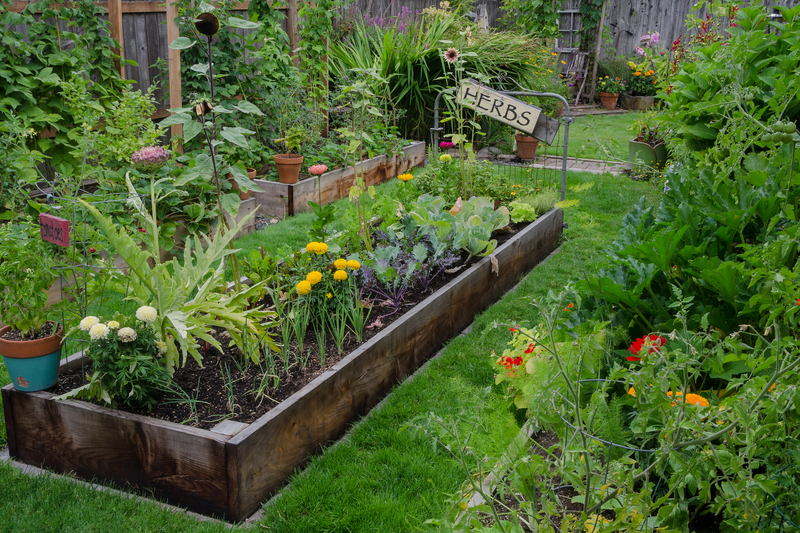Create a Serene Zen Garden for Tranquility and Peace
Posted on 03/07/2025
Create a Serene Zen Garden for Tranquility and Peace
In our fast-paced modern lives, finding a sanctuary of calm is essential for well-being. If you're seeking tranquility, mindfulness, and an escape from daily chaos, creating a serene Zen garden at home is the perfect solution. This comprehensive guide explains how you can design, build, and maintain a peaceful Zen-inspired garden, cultivating a haven for relaxation and meditation. Whether you have a sprawling backyard or a small balcony, a Zen retreat is within reach.

What is a Zen Garden?
Zen gardens, also known as Japanese rock gardens or karesansui, were developed centuries ago by Zen Buddhist monks. These minimalist gardens are designed to imitate the essence of nature, fostering inner harmony and deep contemplation. Using rocks, gravel, sand, moss, and minimal plant life, Zen gardens focus on simplicity, balance, and symbolism.
- Gravel or sand: Representing water or the emptiness of space
- Large rocks: Emulating mountains or islands
- Moss and minimal greenery: For understated beauty
- Ornaments: Lanterns, bridges, and Buddha statues as accents
Creating a calming Zen garden isn't only about aesthetics--it's about awakening a deeper sense of peace within your life.
Why You Should Create a Zen Garden for Tranquility
The primary purpose of a Zen garden is to foster tranquility and peace. Sitting or strolling in this serene environment encourages mindfulness and helps release stress. Here's why you'll benefit from designing a Zen oasis at home:
- Reduces Stress: The act of raking gravel, arranging rocks, and tending to simple plants is meditative, helping to quiet a racing mind.
- Promotes Mindfulness: Zen gardens are an invitation to pause, observe, and reflect, cultivating present-moment awareness.
- Improves Emotional Well-being: A tranquil environment supports calmness, lowers anxiety, and boosts a sense of contentment.
- Enhances Outdoor Spaces: Even the smallest outdoor areas or indoor corners can be transformed with Zen principles.
- Low Maintenance: Unlike lush, elaborate landscapes, Zen gardens require less water, fertilization, and pruning.
Planning Your Peaceful Zen Retreat
Effective planning is crucial for a successful Zen garden. Start by clarifying your intentions: Will the garden be for meditation, a visual focal point, or an artistic project? Next, consider these elements:
1. Choosing the Location
- Backyard Zen Garden: Dedicate a corner or section of your yard for quiet reflection.
- Balcony/Patio Zen Retreat: Use containers, low trays, and small stones to create a mini sanctuary.
- Indoor Zen Oasis: Place a tabletop Zen garden on your desk or window sill to bring calmness indoors.
2. Determining Your Zen Garden Style
- Karesansui (Dry Landscape): Focus on rocks, gravel, and sand with very few plants.
- Chaniwa (Tea Garden): Includes stepping stones, lanterns, and simple plantings, usually associated with the Japanese tea ceremony.
- Tsuboniwa (Courtyard Garden): Perfect for small spaces--features moss, stones, and perhaps a water basin.
Step-by-Step Guide: How to Create a Zen Garden for Tranquility and Peace
Step 1: Design Your Layout
Sketch your garden's shape and flow. Traditionally, Zen gardens have irregular, organic borders, avoiding symmetry. Your design should encourage the eye to wander gently, never fixating for too long.
- Pathways: Consider winding stone paths for movement and contemplation.
- Focal Points: Large rocks, a stone lantern, or a mossy mound can anchor the space and draw attention.
Step 2: Prepare the Ground
- Clear the Area: Remove grass, debris, and weeds. Level the ground, if necessary.
- Add a Base Layer: Use landscape fabric to prevent weed growth.
- Frame the Perimeter: Edging stones, wood, or bamboo can define the space.
Step 3: Select Core Zen Garden Materials
- Sand/Gravel: Opt for pale, uniform pebbles or sand. These materials represent the ocean or sky and are fundamental for raking tranquil patterns.
- Rocks/Boulders: Choose natural, weathered stones in irregular shapes and sizes. Position them thoughtfully (odd numbers are traditional) to mimic natural landscapes.
- Moss: Adds a touch of green, echoing Kyoto's famous temple gardens. Moss grows best in shady, moist corners.
- Simple Plants: If you wish, add a few low-maintenance, non-flowering varieties like dwarf bamboo, ferns, or Japanese maples.
Step 4: Arrange Elements with Intention
Every element in your tranquil Zen garden should be placed purposefully.
- Balance: Arrange stones asymmetrically for a natural, organic feel.
- Negative Space: Keep areas of clean gravel or sand for visual quietude.
- Symbolism: For example, three stones can represent heaven, earth, and humanity.
- Scale: Choose rocks and objects in proportion to your space.
Step 5: Add Water or Water Features (Optional)
- Symbolic Water: Raked sand and gravel evoke the movement of streams and waves.
- Real Water: Install a small basin, pond, or bamboo fountain (shishi-odoshi) for soothing sound and visual appeal.
Step 6: Incorporate Zen Ornaments
- Stone Lanterns: Traditional accents that add timeless beauty.
- Bamboo Fountains: Moving water purifies and brings subtle, calming sound.
- Buddha Statues: Optional spiritual or aesthetic elements for deeper tranquility.
Step 7: Maintain Your Tranquil Zen Garden
- Rake Often: Smooth gravel into flowing, meditative lines. Raking is both decorative and a mindfulness exercise.
- Prune Plants: Keep any greenery neatly trimmed and restrained.
- Weed Regularly: Maintain the minimalist appearance by keeping intruding plants at bay.
- Seasonal Updates: Add subtle changes with each season to keep your Zen space vibrant and alive.
The Art of Zen Raking: Patterns and Symbolism
Raking the gravel or sand is a central, almost meditative ritual in maintaining a peaceful Zen garden. Patterns can evoke different emotions and meanings:
- Parallel lines: Represent calm water and a still mind.
- Waves or swirls: Suggest movement and life energy.
- Circles: Encircle stones, symbolizing ripples spreading from a single event or one's presence in the universe.
- Random scatter: Sometimes used to break up patterns and emphasize impermanence.
The act of raking itself is meditative--focus on the present moment, let go of distractions, and enjoy the simplicity of movement.
Zen Garden Plants: Restraint and Minimalism
Traditional Zen gardens feature few plants, focusing instead on rocks and raked gravel for maximum serenity. However, carefully chosen greenery can enhance your oasis of peace:
- Moss: Grows quietly in shady spots, adding softness and lush texture.
- Dwarf bamboo: Adds height and a gentle rustle with the wind.
- Japanese maple: Elegant shape and color, particularly stunning in autumn.
- Ferns: For their subtle foliage and shade-tolerance.
- Evergreen shrubs: Such as boxwood, for year-round greenery.
Tip: Avoid flowering or overly colorful plants to preserve a calm, understated look.
Integrating Zen Garden Tranquility into Small or Urban Spaces
You don't need a vast yard to nurture tranquility. Small Zen gardens are ideal for apartments, balconies, or courtyards:
- Miniature tabletop Zen gardens: Use sand, tiny pebbles, and little figurines--perfect for a desk or meditation altar.
- Balcony garden trays: Create portable Zen scenes in large planters or wooden boxes.
- Container moss corners: Use ceramic bowls to grow moss, adding a miniature stone or bamboo piece for accent.
The Spiritual Benefits of a Tranquil Zen Garden
Beyond beauty, a well-designed Zen garden offers deep spiritual rewards:
- Mindfulness: Being present while raking, arranging rocks, and observing the shifting light.
- Harmony with Nature: Learning to appreciate asymmetry, imperfection (wabi-sabi), and the cycles of seasons.
- Reflection: Find answers or rest your mind by simply sitting quietly amid your peaceful surroundings.
- Contemplation: Consider each stone, each pattern, and what they reflect about life's flow and obstacles.
In Zen philosophy, the external arrangement of a garden is inseparable from the internal arrangement of the soul, giving you a living connection to tranquility and balance.
Common Mistakes to Avoid When Creating a Zen Garden
- Overcrowding: Less is more. Resist the urge to fill every space with rocks or plants.
- Ignoring Scale: Match stone and ornament sizes to the space to avoid visual clutter.
- Inconsistent Materials: Stick to a unified palette to evoke harmony.
- Skipping Intention: Avoid random placements--every element should have meaning.
- Neglecting Maintenance: Even low-maintenance spaces need attention to stay clean and serene.

Frequently Asked Questions about Zen Gardens for Tranquility and Peace
Do Zen gardens really help with stress relief?
Yes. Multiple studies and centuries of tradition point to profound reductions in anxiety and increased mindfulness when interacting with a peaceful Zen garden.
Can I have a Zen garden in a small apartment?
Absolutely! Try a tabletop Zen garden, container moss garden, or a vertical wall garden with rocks and sand for miniature serenity.
Do I need special tools?
All you need to start is a rake (even a fork for small spaces), a few rocks, sand or gravel, and a sense of presence. Specialized bamboo rakes and lanterns can be added as you refine your garden.
How much does it cost to create a Zen garden?
Costs vary. DIY Zen gardens can be budget-friendly, especially if you use local stones and repurpose containers. Specialty stones and imported ornaments will raise the budget but add authenticity.
Conclusion: Cultivate Peace with Your Own Zen Garden
Incorporating a serene Zen garden into your home, yard, or workspace brings a sense of tranquility, mindfulness, and enduring peace to your life. By following the principles of simplicity, intention, and subtle beauty, you'll not only create a visually stunning retreat but nurture your own mental wellness. Embrace the art of Zen gardening, and discover how a space for contemplation can recharge your spirit every day.
Begin your journey today--transform a quiet corner of your world into a sacred retreat and enjoy the serenity and balance a Zen garden provides.
Latest Posts
Transforming Organic Scraps into Enriched Soil for Thriving Gardens
Essential Gardening Tools Every Outdoor Enthusiast Needs
Reviving a Neglected Garden: Your Starting Point
Unlocking Nature's Secrets: 9 Must-Know Gardening Tips for Rookies

